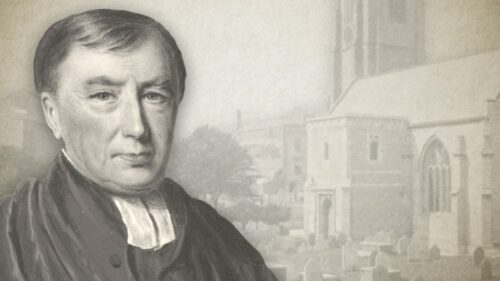
April 10—Morning Devotion
“When Jesus therefore saw his mother, and the disciple standing by, whom he loved, he saith unto his mother, woman, behold thy son. Then saith he to the disciple, behold thy mother.”—John 19:26, 27
This was the second among the dying words of the Lord Jesus; and no doubt, of high importance in their full sense and meaning: not simply to recommend Mary to the care of the beloved apostle, John, but probably of greater moment in reference to the church of Jesus at large. My soul, is it not very certain that the Lord Jesus knew all the events which would take place in all generations of his people? And as such, did not Jesus perfectly well know also that the time would come when divine honours would be offered to Mary? These points cannot be disputed. Well then, is it not worthy the closest observation, that Jesus both in this place, and upon all other occasions, when speaking of Mary, called her woman? Why so? If, as Jesus knew, that there would be some who would pray to her, and call her mother of God, by which name the Holy Ghost never, distinguished her, neither the Lord Jesus himself; could there have been a more decided method adopted than this to discountenance such idolatry, than when Jesus, in his dying moments, called Mary only woman? Besides, was it not on another account, that as Jesus was to be the seed of the woman, which was promised to bruise the serpent’s head, such a dying testimony might serve instead of a thousand witnesses, in proof of the confirmation of the fact: and Mary’s song might be the song of thousands—”My soul doth magnify the Lord, and my spirit hath rejoiced in God my Saviour!” But when we have thus attended to the second cry of Christ upon the cross, in reference to those sweet points, do thou, my soul, remember alse how tenderly those expressions of thy Lord recommend all the endearing affections of love and regard through all the members of Christ’s mystical body. To behold our mother, or to behold our sons, are only different expressions to intimate that all true believers in Jesus are members of one another, and of his body, his flesh, and his bones. And as it was by our Lord himself in this life, so is it with all his redeemed, both in this life and in that which is to come; they who do the will of his Father, which is in heaven, the same are Christ’s brethren, and sisters, and mother.
Robert Hawker (1753-1827) was an Anglican (High-Calvinist) preacher who served as Vicar of Charles Church, Plymouth. John Hazelton wrote of him:
“The prominent features…in Robert Hawker's testimony…was the Person of Christ….Dr. Hawker delighted to speak of his Lord as "My most glorious Christ.” What anxious heart but finds at times in the perusal of the doctor's writings a measure of relief, a softening, and a mellowing? an almost imperceptible yet secret and constraining power in leading out of self and off from the misery and bondage of the flesh into a contemplation of the Person and preciousness of Christ as "the chiefest among ten thousand and the altogether lovely." Christ and Him crucified was emphatically the burden of his song and the keynote of his ministry. He preached his last sermon in Charles Church on March 18th, 1827, and on April 6th he died, after being six years curate and forty-three years vicar of the parish. On the last day of his life he repeated a part of Ephesians 1, from the 6th to the 12th verses, and as he proceeded he enlarged on the verses, but dwelt more fully on these words: "To the praise of His glory Who first trusted in Christ." He paused and asked, "Who first trusted in Christ?" And then made this answer: "It was God the Father Who first trusted in Christ."
Robert Hawker on the Biblical Covenants (Complete)
Robert Hawker's Poor Man's Morning Portions





